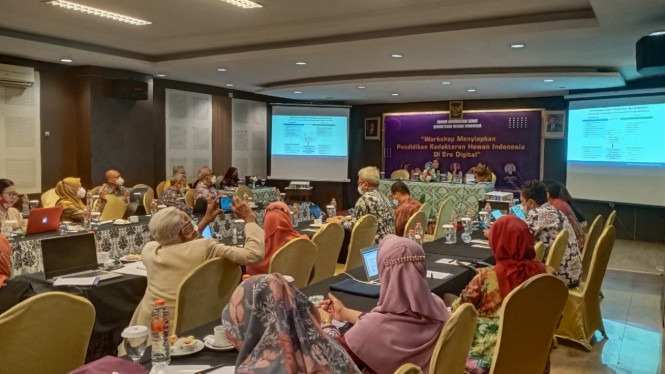Accelerate the Digitization of the World of Veterinary Medicine through the Workshop on the Digitization of Veterinary Education in Indonesia
In an effort to face global challenges, the Communication Forum of the Indonesian Veterinary Medicine Senate (SKHI) held a workshop to prepare Indonesian veterinary education in the digital era at the University Club Hotel, Gadjah Mada University, Yogyakarta, Monday (19/09/2022). The purpose of this workshop is to accelerate the digitization of education at the Faculty of Veterinary Medicine.
In this workshop, hot issues were raised about the acceleration of digitization and the challenges of Indonesian veterinary education in global health. Present at this workshop were the Chair of the Senate, the Secretary of the Senate and the Dean of the Faculty of Veterinary Medicine (FVM) throughout Indonesia.

The head of the SKHI Communication Forum, Prof. Dr. drh. Bambang Sumiarto, SU, M.Sc said that strengthening veterinary education throughout Indonesia is the key to improving the components of sustainable and global quality animal health services. In this digital era, in implementing policies in animal production, aquaculture, food safety and effective disease control and prevention, digital technology must be optimized. Furthermore, it is said that the spirit and foothold of digitalization in veterinary education has been carried out at the Faculty of Veterinary Medicine, but has not yet been implemented in the curriculum of the Faculty of Veterinary Medicine.
Chair of the Senate of the Faculty of Veterinary Medicine, Udayana University, Prof. Dr. Drh I ketut Puja, M.Kes who was present at the workshop said that apart from the issue of digitalization in veterinary education, the biggest challenge of veterinary medicine today is regarding the recognition of the role of veterinary medicine in animal health services in Indonesia. He gave an example that animal health matters are not yet mandatory for the government. This causes the provincial, district and city governments to make animal health a matter that does not need to be prioritized. As a result, when there are disasters such as outbreaks of mouth and nail disease, rabies and animal diseases that can be transmitted to humans (zoonotic), the government seems very troubled to deal with them.

Prof. Bambang added that in 2022, a discussion will be held at IPB Bogor to accelerate the occurrence of digital education. The results are expected to accelerate the occurrence of digital veterinary education. "We must be optimistic because we already have the basics of veterinary education in the digital era. We still need hard work not only from the Faculty of Veterinary Medicine, but from Communicate Forum, the Indonesian Veterinary Medicine Senate," he explained.
Chairman of the Association of Indonesian Veterinary Medicine Faculties, Prof. drh. Teguh Budipitojo, MP, Ph.D. who was also present at the time said that the concept of digital education was still new. "We are not too late,' he added. We must hurry to implement the digitalization of education in the classroom.





